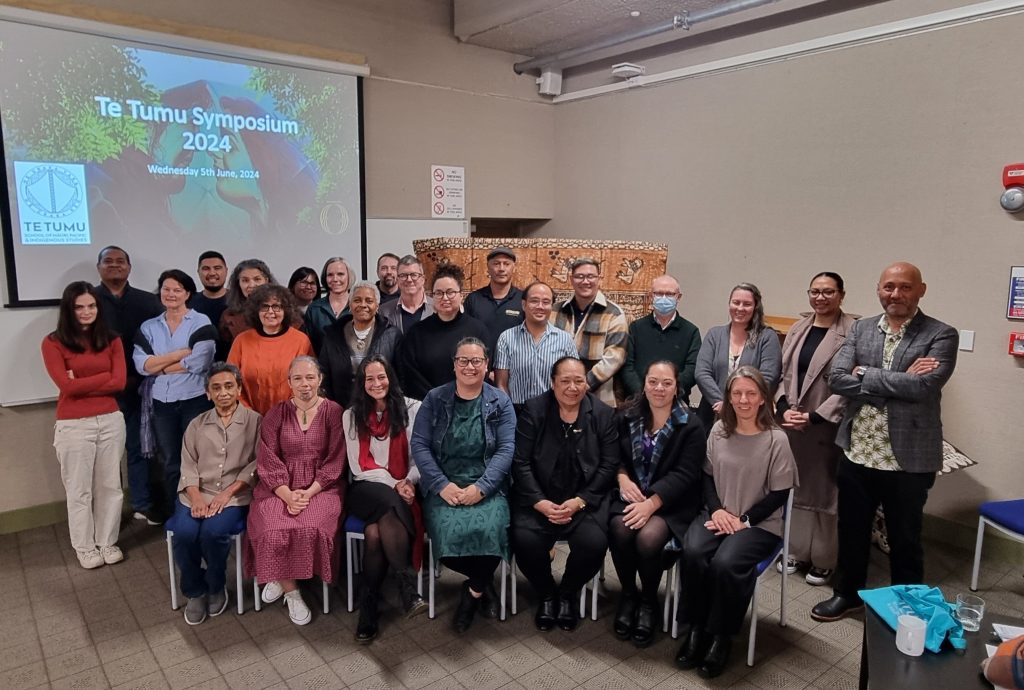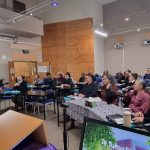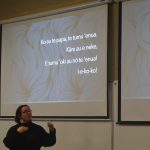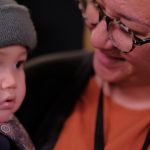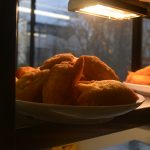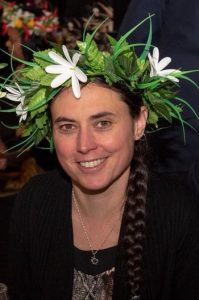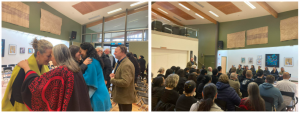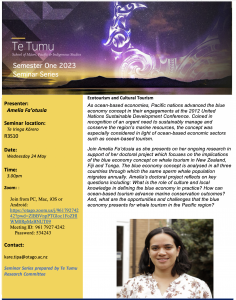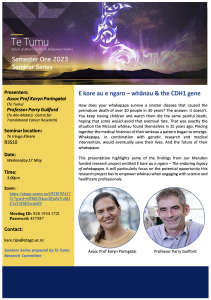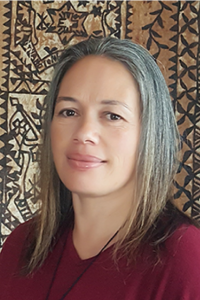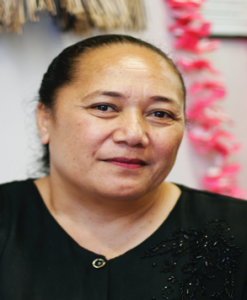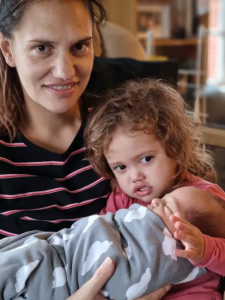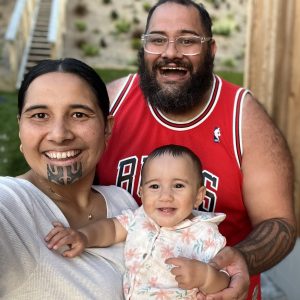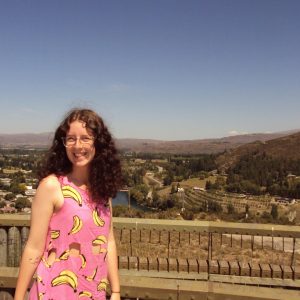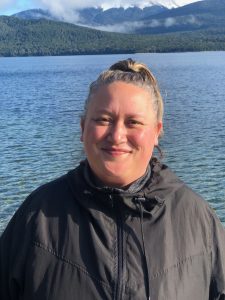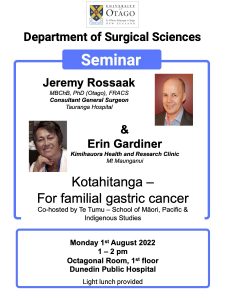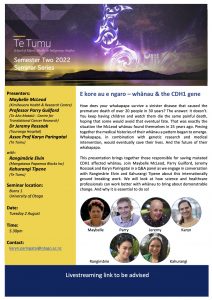Inaugural Te Tumu Symposium a showcase of diverse research excellence
On Wednesday 5 June, Te Tumu, School of Māori, Pacific and Indigenous Studies, hosted its inaugural research symposium to share and celebrate research from Te Tumu. The day began with a welcome from Te Tumu Dean Prof Patrick Vakaoti and a history of Te Tumu from Prof Michael Reilly. The programme included four sessions of Te Tumu staff and postgraduate students’ presentations, constructive question and answers segments, feedback, and encouragement.
Supported by Te Tumu’s Research Committee and Postgraduate Committee, the event welcomed attendance from those who are based in Ōtepoti, as well as distance students who are based in Te Whanganui ā Tara, and as far afield as New Caledonia. With special Tītī and fry bread kai, this gathering was truly an inspiring occasion and speaks to exciting research work that Te Tumu staff and students are doing locally, and regionally that are important contributions for their communities, and for the growth of Māori, Pacific and Indigenous Studies scholarship.
Session 1 was facilitated by Dr Paerau Warbrick, a lecturer in Māori Studies, and included presentations by Te Tumu staff member Paia Taani on intergenerational language transmission; and PhD students, Jenni Tupu who presented about transracial adoption, and Ella Cameron-Smith who presented on Ngaati Korokii Kahukura kai identities.
Session 2 was facilitated by Dr Telesia Kalavite, a lecturer in Pacific Studies, and included presentations by four PhD students: Frédéric Dichtel who presented on te reo grammatical structures; Regina Maniam who presented on engaging Indigenous values and methods in doctoral research; Stacey Kokaua-Balfour who presented on Cook Islands’ creative texts relating to the environment and climate change; and Jay Quintos who presented on critical perspectives on films about the Tboli people in the Philippines.
Session 3 was facilitated by Prof Michael Reilly, the Postgraduate Chair of Te Tumu. The session included staff member Prof Richard Jackson who presented on non-violent approaches to counterterrorism, and two PhD students: Jude Bautista who presented on visual social semiotics and critical lenses in discourse analyses; Kim Cope Tait who presented on personal sovereignty in the poetry of Hinemoana Baker.
Session 4 was facilitated by Dr Emma Powell, lecturer in Indigenous Studies and Programme Coordinator of the Master of Indigenous Studies (MIndS). The session included three MIndS distance students: Melissa Denzler, based in Te Whanganui ā Tara who presented on the cultural taxation of kaiako Māori; Elizabeth Hamilton, based in Whakatū, who presented on a approach for honouring Te Tiriti specifically relating to language learning policies for migrants and former refugees; and James Uri-Puati, based in the Cook Islands, who presented on a critical Indigenous framework for theorising second language learning.
Te reo Māori o ngā Kūki ‘Āirani: Dr Akevai Nicholas
Earlier in the week Te Tumu hosted a visiting scholar from the University of Auckland, Dr Akevai Nicholas. Akevai is from the island of Ma‘uke (Cook Islands) and is a Senior lecturer in Māori studies at the University of Auckland. She has a linguistics and Māori Studies background and her research focuses on the description, documentation, and revitalisation of her ancestral language.
Staff and students of Te Tumu, and the wider University community, were fortunate to meet and engage in a rich and insightful kōrero with Akevai. Informal in nature, the discussion and questions from those present kept rolling in and Akevai’s knowledge and expertise in the area of linguistics associated with te reo Māori o konei me ngā Kūki ‘Āirani was notable. A sobering point of discussion was the worryingly low proportion of Cook Islands Māori speakers in Aotearoa and the home island, it is a language that is very much in critical need of revitalisation and initiatives to teach the youth their language, sometimes alongside their parents. There is no denying a connection between Māori of Aotearoa and Māori of Kūki ‘Airani, genealogically, culturally and linguistically, therefore, a call to support and work together to achieve their reo aspirations is needed.
Some of the other key messages and kaupapa discussed included intergenerational language transmission, the geography and demography of the speaking populations, the introduction and interaction with English speaking people and some key researchers and leaders in linguistics of Indigenous Polynesian languages from the 1960’s to now. It was not difficult to hear the impact Dr Akevai Nicholas is making with her research, a trail blazer, a strong advocate and a passionate Ma‘ukean, who is a crucial champion of and for the revitalisation of te reo Māori o ngā Kūki ‘Āirani and te reo Māori Aotearoa. Meitaki nui Dr Akevai Nicholas.
Te Poroāki o Lachy Paterson & te Pōhiri o Roma Donaldson-Gush
Last week Te Tumu celebrated well with the retirement of Emeritus Professor Lachy Paterson and the arrival of new Māori Studies pūkenga, Roma Donaldson-Gush. Roma, of Ngāti Porou, Taranaki, Ngāti Tūwharetoa, Kotirana descent, joins Te Tumu staff with a background in bilingualism and intergenerational language and culture transmission for Māori. Roma will be completing her PhD studies as well as teaching into the Māori Studies programme. She is a Te Tumu alumnus having previously completed postgraduate study looking at Te Reo Māori in urban New Zealand. The pōhiri, held on Wednesday 28 June, included representatives from Office of Māori Development, Te Huka Mātauraka, Te Rōpū Māori, staff from Te Tumu and the wider university. Roma was supported by her whānau, colleagues, and friends in a day filled with the celebration of new relationships and excitement for the future of Te Tumu.
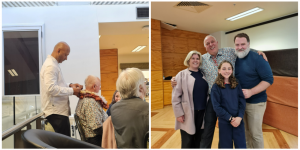
L: Dean of Te Tumu Patrick Vakaoti garlanding Lachy with a salusalu. R: Angela Wanhalla, Lachy Paterson and whānau
Ara mai he tētēkura, wehe atu he tētēkura. With a new frond beginning, a mature frond leaves.
With over 16 years of service as a teacher, mentor, friend, and conspirator, Lachy Paterson was farewelled in an intimate gathering of colleagues and whānau on Friday 30 June. Many spoke of the contributions Lachy has made to Māori Studies, Te Tumu and the university as a whole with several teaching, administration and leadership roles. Stories unfolded about his days as a student, teaching fellow and ultimately his unrelenting commitment to Te Tumu. Although it was a bittersweet day, Te Tumu looks forward to a continuing relationship with Lachy as an emeritus professor and eagerly await his future publications and foray into YouTube.
Seminar: Ecotourism and Cultural Tourism
Amelia Fa’otusia, a PhD candidate at Australia National University, is currently in New Zealand undertaking research on whale tourism, as part of a wider comparison with similar ventures in Fiji and Tonga, and has kindly agreed to give a seminar to Te Tumu on “Ecotourism and Cultural Tourism”.
Amelia’s seminar will be in Te Iringa Kōrero (R3S10, 3rd floor of Te Tumu) at 3pm (NZ Time), on Wednesday 24 May.
This will also be available via Zoom. Click here to enter the Zoom Room.
Meeting ID 961 7927 4242
Password 534243
All interested people are most welcome to attend.
Please click on the poster for more information,
Seminar: E kore au e ngaro – whānau & the CDH1 gene
Assoc Professor Karyn Paringatai of Te Tumu has been collaborating with Professor Parry Guilford of Te Aho Matatū – Centre for Relational Cancer Research in a Marsden-funded project on the impact on Māori whānau of the CDH1 gene, a condition with a high risk of stomach cancer.
Come along to the next Te Tumu seminar to hear how Humanities and the Health Sciences have been working together to create positive outcomes for Māori whānau.
When and where? At 3.00pm in Te Iringa Kōrero (third floor of Te Tumu), Wednesday 18 May.
People can also “attend” via Zoom. Click here to enter the Zoom room. Meeting ID: 928 1934 1721 Password: 457587.
Click on the poster for more info. All Interested people are most welcome to attend.
Reflections on ‘To Hell With Drowning’ AAPS Conference 2023
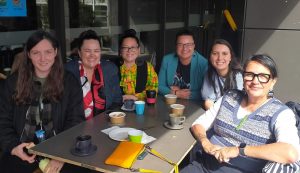
With fellow Māori scholars (L-R): Sam Iti Prendergast, Alice Te Punga Somerville, Marama Salsano, Innez Haua, Karamea, Jo Maarama Kāmira
The following is a reflective piece from Karamea Moana Wright, one of Te Tumu’s PhD candidates in Pacific Islands Studies.
The first Australia Association for Pacific Studies’ conference I participated in was held primarily online in 2021, with separate hubs in Aotearoa and Australia. Because we were in groups on our own campuses, I don’t think I fully understood the magnitude or value of the conference and the association itself until this month, when I attended for the first time in person.
The four days in Canberra at the Australian National University were packed with phenomenal panels, plenaries, roundtables, and whakawhanaungatanga with incredible Pacific thinkers, researchers, artists, leaders, and poets influential in our region and discipline.
This conference opened my eyes in greater measure to salient contemporary conversations taking place in the field, how my own research sits within the broader landscape of Māori, Pacific, and Indigenous Studies, and to see what is possible in my work moving forward. The AAPS conference has left me hopeful, motivated, refreshed, rejuvenated, and encouraged, underscoring the necessity to return for the next AAPS conference in 2023, held in Sydney.
Te Tumu’s UORG success
Three Te Tumu staff, Pai Taani, Dr Telesia Kalavite and Associate Professor Karyn Paringatai, have been awarded University of Otago Research Grants (UORGs) that will allow them to undertake or further research projects.
The title of Paia Taani’s research project is “I ahatia taku reo Māori? Tracking intergenerational transmission of te reo Māori within whānau”. She says, “my own experiences of learning te reo Māori as a second language and raising my own children with the language sparked my interest to investigate what happened to my language. This research project will therefore investigate the intergenerational transmission of te reo Māori within my whānau.”
Paia’s aim is to is to contribute to the existing research and literature about the use of te reo Māori within the context of whānau. Her research includes analysing whānau narratives to examine the historical intergenerational transmission of te reo Māori and will highlight critical moments within these narratives to explore the factors which affected language transmission within her whānau. The key themes emerging from these accounts will inform future language pathways for her whānau, and may also be used to generate recommendations to offer other whānau who may be seeking to reclaim their language.
The University of Otago Research Grant will help fund travel to the North Island to undertake hui and kōrero with participants, and will also fund a research assistant to undertake transcription work.
Paia expects that she will publish at least two journal articles from her research project, and she will one conference presentation. Another expected output of this research project is a hui with her participants where she will disseminate her findings and discuss ways to move forward with future research and support for whānau wanting to reclaim their language.
Telesia Kalavite’s research project explores “The implications of changing cultural practices in Tongan wedding celebrations in New Zealand”, and how these changes impact on Tongan people’s lives in New Zealand. This project has national and international significance in understanding the development of Tongan culture and identity in the diaspora as well as the myriad cultural, social, economic, political and environmental impacts that are encompassed in Tongan wedding celebrations. It will identify and map out traditional cultural practices in Tongan weddings over time and space. This will provide a context in which to explore contemporary factors affecting Tongan wedding practices in Aotearoa.
Telesia sees this as a pilot study for a larger project in the future on how Tongan celebrations impact on Tongan people’s socio-cultural and economic development in Aotearoa New Zealand. She says “I am a Tongan researcher, and it is very important that to get this kind of research righ; there should be people with clear expertise and connection to it, like myself.”
Karyn Paringatai is collaborating with Marcelle Wharerau, formerly a Te Tumu student and staff member who is now an academic based at the Tauranga campus of Te Pua Wānanga ki te Ao – Faculty of Māori and Indigenous Studies, University of Waikato. Their project is titled “Te Aho Tāngaengae: Māmā, Wahine, Māori, Academic”. Socio-economic stability through intergenerational mobility is a priority of whānau Māori; ensuring that future generations have full access to a range of resources that enhances intergenerational whānau wellbeing. Income, education and occupation feature predominantly in intergenerational mobility studies as primary indicators of social and economic status. However, this focus is too narrow and neglects the importance of also embedding cultural stability and responsibility. Whilst socio-economic stability and upward mobility is a priority of Māori, equally important is the intergenerational transmission of te reo Māori and tikanga Māori.
Colonisation has had profound negative effects on all aspects of te ao Māori, including maintaining intergenerational responsibilities for protecting and enhancing the mana of whānau, hapū and iwi. In this unique research, Karyn and Marcelle aim to show how the reestablishment of this intergenerational responsibility to contribute to the decolonisation of te ao Māori must be a deliberate priority and why it is of urgency to do so.
Te Aho Tāngaengae gives voice to the narratives of wāhine Māori academics who are first in family to complete higher education/university and the mechanisms they employ in the intergenerational transmission of cultural capital. Increasing the capacity, and linguistic and cultural capabilities of Māori across generations who can tangibly contribute to improving the social, economic and political wellbeing of te ao Māori must be a priority. This research is important to reveal new insights into the methods used that have the potential to accelerate transformative change within whānau for generations to come.
Opinion Piece in Newsroom
An “op-ed” from Lachy Paterson has just appeared in Newsroom, asking why New Zealand still lets fireworks off for Guy Fawkes Day, when there are far more relevant historical events from Aotearoa that we could be remembering, such as on the 5th of November when the infamous invasion of Parihaka occurred. Click here to read the article.
August graduands
This Saturday (20 August) is graduation day. It is always wonderful when Te Tumu students graduate, but especially postgraduate students. Completing an Honours, Masters, or Doctoral degree requires a huge amount of determination, because it encompasses a significant piece of self-directed research. A dissertation or thesis is not easy task. He mihi tēnei hei whakahōnore i ngā tāngata kua whakaoti i taua haerenga.
“He Kohinga Kōrero: A Selected Group of Māori Musicians and Performers’ Experiences of
the 1960s Through the Māori Showband Movement,” is grounded in Māori Studies but
informed by previous research in Ethnomusicology. The written component of this thesis is
partnered with my nominated creative component Tutuku. Tutuku is a digital archive created alongside “He Kohinga Kōrero,” which uses the research gained as informed commentary within the digital archive.
This thesis creates a new understanding of the Māori Showband identity and success.
Scholarly research surrounding this popular musical movement is sparse. The first part of this thesis investigates the cultural and social climate for Māori before 1960 that lead to the
opportunities and emergence of this musical movement. Chapter one introduces the digital archive and discusses the barriers to accessing stories and knowledge. It also lays down the ground work of the research methods used and the importance of kaupapa Māori research methodologies.

